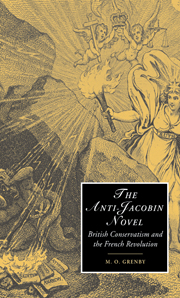Book contents
- Frontmatter
- Contents
- Preface
- Acknowledgements
- Introduction
- 1 Novels reproved and reprieved
- 2 Representing revolution
- 3 The new philosophy
- 4 The vaurien and the hierarchy of Jacobinism
- 5 Levellers, nabobs and the manners of the great: the novel's defence of hierarchy
- 6 The creation of orthodoxy: constructing the anti-Jacobin novel
- 7 Conclusion
- Notes
- Select bibliography
- Index
6 - The creation of orthodoxy: constructing the anti-Jacobin novel
Published online by Cambridge University Press: 22 September 2009
- Frontmatter
- Contents
- Preface
- Acknowledgements
- Introduction
- 1 Novels reproved and reprieved
- 2 Representing revolution
- 3 The new philosophy
- 4 The vaurien and the hierarchy of Jacobinism
- 5 Levellers, nabobs and the manners of the great: the novel's defence of hierarchy
- 6 The creation of orthodoxy: constructing the anti-Jacobin novel
- 7 Conclusion
- Notes
- Select bibliography
- Index
Summary
The Stagyrite, who rules from Nature drew,
Opinions gave, but gave his reasons too.
Our great Dictators, take a shorter way, –
Who shall dispute what the Reviewers say?
Their word's sufficient; and to ask a reason,
In such a state as theirs, is downright treason.
Charles Churchill, The Apology. Addressed to the Critical Reviewers (1761), quoted by William Pontey, The Rotten Reviewers; or, a Dressing for the Morbid Branches of the Anti-Jacobin and Critical Reviews (1807?)From the early 1790s onwards conservative novels consistently outnumbered the radical fictions that had provoked them into being, and by the turn of the century succeeded in almost entirely vanquishing Things As They Are and Man As He Should Be from the booksellers' lists and the circulating libraries' shelves. To be able to assess this literary phenomenon it has been necessary to consider at the outset exactly what defined the anti-Jacobin novel. Having done this, the more complicated question is, why did the anti-Jacobin novel achieve and sustain such prevalence? Why, in other words, were they written?
Implicit in my analysis of the anti-Jacobin novel has been the assumption that its popularity and eventual dominance is certainly a symptom, and perhaps also in a limited way, a cause, of the almost hegemonic political conservatism that characterised Britain from the mid 1790s until after Waterloo, strangely calm seas disturbed by only the occasional squall.
- Type
- Chapter
- Information
- The Anti-Jacobin NovelBritish Conservatism and the French Revolution, pp. 169 - 202Publisher: Cambridge University PressPrint publication year: 2001



